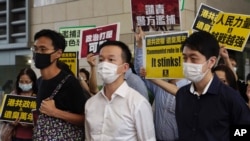Hong Kong police on Tuesday arrested eight activists in connection with a July protest, the latest in a widening crackdown on dissent in the semi-autonomous Chinese territory.
Local media reported that those arrested included former legislators Wu Chi-wei, Eddie Chu and “Longhair” Leung Kwok-hung, along with Civil Human Rights Front’s (CHRF's) Figo Chan, among others.
The police accused them of “inciting, organizing and taking part in an unauthorized assembly,” referring to the July 1 demonstrations in which thousands defied a protest ban and rallied on the streets against the national security law imposed on the city by Beijing the day before.
Speaking to reporters after he was released on bail, Figo of the pro-democracy CHRF said Hong Kong authorities are oppressing dissidents by filing unreasonable charges.
“I strongly condemn the Hong Kong government for continuously suppressing Hong Kong citizens,” he said.
Since pro-democracy protests erupted in Hong Kong in 2019, the city’s police force has been at the forefront of Beijing’s efforts to eliminate the demonstrations.
According to a survey published by Hong Kong Public Opinion Research Institute on Tuesday, the police now rank last in public approval among Hong Kong's "disciplinary forces," which include first responders, correctional officers, People's Liberation Army Hong Kong Garrison troops, anti-corruption investigators, and customs and immigration officials.
“The Police Force attains a rating of 40.3 marks, with 34% of the sample giving zero mark and continues to be the lowest among the nine disciplinary forces,” the organization said.
Chan Ka Lok, an associate professor and director of the Comparative Governance and Public Policy Research Center at Hong Kong Baptist University, said the low ratings were due to police abuse of power, and the force’s unwillingness to establish an independent investigation committee to assess police performance in handling the pro-democracy movement since 2019.
Tuesday’s arrests were carried out hours after the United States sanctioned another 14 Chinese officials over China’s move last month to expel four pro-democracy lawmakers from Hong Kong’s legislature. When asked whether there is any correlation, Chan told VOA that “the police's approach is a replay of ‘hostage diplomacy’ in the Cold War era.”
Since Monday, more than a dozen Hong Kong citizens have been arrested for their roles in pro-democracy demonstrations. Chan said these arrests resemble the mass arrests often used by the Chinese police force in the mainland and will turn Hong Kong into a place ruled by fear.
New pro-Beijing party
Meanwhile, a group of mainland-born, pro-establishment executives working in Hong Kong have founded a new political party in a bid to influence local government policies.
The Bauhinia Party was founded in May by three powerful executives: Li Shan, a member of the Chinese People’s Political Consultative Conference (CPPCC) and director of Credit Suisse Group AG; Huang Qiuzhi, chairman of CMMB Vision Holdings Limited; and Chen Jianwen, chairman of Bonjour Holdings Limited. Li and Wong were born in mainland China and later became Hong Kong residents.
According the Hong Kong Companies Registry, a government department that registers local and foreign companies, the party seeks to “promote a democratic political system best suited to Hong Kong based on the rule of law and civil liberty with the realization of universal suffrage as guaranteed by the Basic Law, so as to safeguard Hong Kong’s long-term prosperity and stability.”
But Hong Kong commentator Stephen Shiu said the creation of the party shows Beijing is no longer satisfied with old pro-establishment forces and hopes a new party representing new immigrants from the mainland can help restrain “extremist forces” in the legislature.
Other analysts say that Beijing wants to put its own people into Hong Kong’s political arena.
They argue that to Beijing, even its closest ally, the New People’s Party, is still seen as a local party rather than one formed by its own people.




